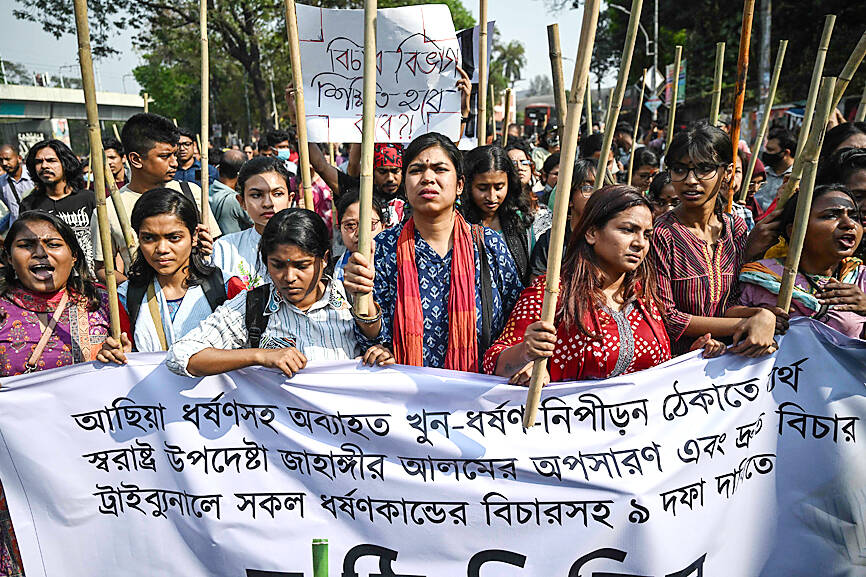Arrested for sexually harassing a Bangladeshi university student, Asif Sardar Arnab was soon released — greeted by a cheering crowd who presented him with flower garlands and a Koran.
His alleged victim was a student who enthusiastically supported the youth-led uprising that overthrew the Muslim-majority nation’s autocratic government last year.
That young woman, after receiving a torrent of violent threats from religious hardliners emboldened by the political upheaval, now wonders whether she made the right choice.

Photo: AF
“A perpetrator was freed because of a mob,” she said in a social media post.
“You can’t imagine the number of rape and death threats I’ve received,” said the woman, who cannot be identified due to Bangladeshi laws designed to protect sexual harassment complainants from retribution.
“We made a mistake by joining the movement. So many people sacrificed their lives in vain,” she said.
Former Bangladeshi prime minister Sheikh Hasina, ousted in August last year, took a tough stance against radical Muslim movements during her 15-year tenure.
Her government was blamed for gruesome human rights abuses and for many, her departure heralded change.
Since her exit, the hardline and religiously fueled activism that Hasina’s government had driven underground has resurfaced.
Much of it is directed at Bangladeshi women, accused of failing to act with sufficient modesty.
Arnab, who works at the library of the prestigious Dhaka University, was accused of accosting a student on campus, saying that her choice of attire did not sufficiently cover her breasts.
The student complained, and Arnab was arrested. Supporters of Arnab who believed he had acted in appropriate deference to his religious convictions surrounded the police station and demanded his release. They yielded when a court quickly bailed Arnab — something the female student attributed to mob pressure.
Md Talebur Rahman, a spokesman for Dhaka’s police force, said that Arnab was still under investigation, and also acknowledged the menacing behavior his victim had faced.
“She can lodge a complaint against those who have been threatening her,” Rahman added.
It is far from an isolated incident. Several women’s football matches were canceled this year after pitch invasions by radical Muslims angry at women’s participation in sport.
Two women were briefly taken into protective custody by police this month, after an altercation that began when they were harassed for publicly smoking cigarettes by a crowd of men on their way to pray at a mosque.
Muslim groups have also demanded organizers of religious commemorations and other public events remove women from the lineup.
The rising incidences of harassment had left young women feeling unsafe, Dhaka University student Jannatul Promi, 23, said.
“We are going through a crisis,” she said. “The other day, I was waiting for the metro when a man approached me and asked if I should be outside without a veil. As soon as I responded, more people joined him against me.”
Fellow student Nishat Tanjim Nera, 24, said the authorities had failed in their duty.
“Harassment incidents are happening repeatedly, but there is no redress from the government,” she said.
Several recent cases of sexual violence have captured public attention.
An eight-year-old girl died on Thursday from wounds she sustained during a rape days earlier — a case that prompted days of protests and vigils by women in Dhaka and elsewhere. Such is the level of public anger that police have begun transporting rape suspects to court in the middle of the night, fearful of attacks.
Nobel Peace Prize winner Muhammad Yunus, who leads the interim government which replaced Hasina, condemned the “horrific acts of violence” against women.
“This is deeply concerning and completely at odds with our dream of building a new Bangladesh,” he said.
Yunus’ administration has struggled to restore law and order, with many police officers refusing to return to work, and the army was brought in to help.
It has since last month also directed scant police resources to a sweeping crackdown, dubbed Operation Devil Hunt, against gangs allegedly connected to Hasina and working to foment unrest.
Maleka Banu, of the feminist campaign group Bangladesh Mahila Parishad, said those resources would have been better spent on trying to curb sexual violence.
“What good is it for the government to simply express concern? We expected action,” she said. “After Sheikh Hasina’s fall, a series of violent incidents followed. The government was in complete denial... Now, they claim the fallen dictator is behind every crime.”

‘EYE FOR AN EYE’: Two of the men were shot by a male relative of the victims, whose families turned down the opportunity to offer them amnesty, the Supreme Court said Four men were yesterday publicly executed in Afghanistan, the Supreme Court said, the highest number of executions to be carried out in one day since the Taliban’s return to power. The executions in three separate provinces brought to 10 the number of men publicly put to death since 2021, according to an Agence France-Presse tally. Public executions were common during the Taliban’s first rule from 1996 to 2001, with most of them carried out publicly in sports stadiums. Two men were shot around six or seven times by a male relative of the victims in front of spectators in Qala-i-Naw, the center

Australia’s opposition party yesterday withdrew election promises to prevent public servants from working from home and to slash more than one in five federal public-sector jobs. Opposition leader Peter Dutton announced his conservative Liberal Party had dropped its pledge that public servants would be required to work in their offices five days a week except in exceptional circumstances. “I think we made a mistake in relation to this policy,” Dutton told Nine Network television. “I think it’s important that we say that and recognize it, and our intention was to make sure that where taxpayers are working hard and their money is

Canadian Prime Minister Mark Carney is leaning into his banking background as his country fights a trade war with the US, but his financial ties have also made him a target for conspiracy theories. Incorporating tropes familiar to followers of the far-right QAnon movement, conspiratorial social media posts about the Liberal leader have surged ahead of the country’s April 28 election. Posts range from false claims he recited a “satanic chant” at a campaign event to artificial intelligence (AI)-generated images of him in a pool with convicted sex offender Jeffrey Epstein. “He’s the ideal person to be targeted here, for sure, due to

DISPUTE: Beijing seeks global support against Trump’s tariffs, but many governments remain hesitant to align, including India, ASEAN countries and Australia China is reaching out to other nations as the US layers on more tariffs, in what appears to be an attempt by Beijing to form a united front to compel Washington to retreat. Days into the effort, it is meeting only partial success from countries unwilling to ally with the main target of US President Donald Trump’s trade war. Facing the cratering of global markets, Trump on Wednesday backed off his tariffs on most nations for 90 days, saying countries were lining up to negotiate more favorable conditions. China has refused to seek talks, saying the US was insincere and that it